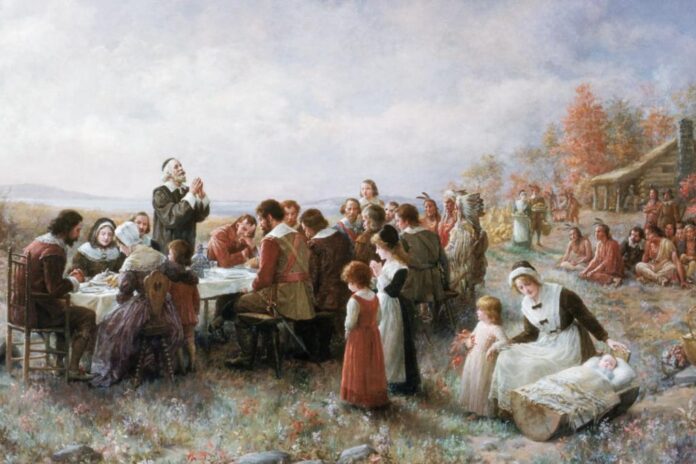
The Pilgrims were, to use the hostile term applied to Israelis in the debate over Palestine, unquestionably “settler colonialists.”
As such, they are increasingly out of favor as Thanksgiving begins to suffer some of the erosion that has drastically diminished Columbus Day.
Thanksgiving is too big a holiday to get dethroned, at least any time soon, but it’s worth sticking up for the Pilgrims now accused of myriad sins.
They have, no doubt, been simplified, airbrushed and romanticized over the years, yet that’s no reason to make them cardboard-cutout villains in a morality tale about the evils of European civilization.
Theirs is a story of extraordinary endurance and faithfulness in which can be seen glimmers of what would become a great experiment in republican government on these shores.
The Pilgrims were so-called separatists who rejected the Church of England.
Harried out of England, they escaped to the Netherlands in pursuit of the right to worship as they pleased.
Then a group decided to make the leap across the Atlantic.
They didn’t come to North America with overwhelming force; indeed, they barely had enough to survive.
They left too late in the year (early September) in a crowded ship, the Mayflower, that was a little longer than a tennis court and under-provisioned.
With 102 passengers in cramped, miserable conditions below decks, roughly 30 crew members and two dogs, the Mayflower crossed the Atlantic in a hard, slow journey of about two months.
It lost one passenger and gained another (a baby named Oceanus).
Approaching shore, in need of some basic governing document, they adopted the famous Mayflower Compact.
The passengers resolved to “covenant and combine ourselves together into a civil body politic, for our better ordering and preservation, and furtherance of the ends aforesaid; and by virtue hereof to enact, constitute and frame such just and equal laws, ordinances, acts, constitutions and offices, from time to time, as shall be thought most meet and convenient for the general good of the Colony, unto which we promise all due submission and obedience.”
In the Compact, as John Turner points out in his book “They Knew They Were Pilgrims,” the passengers didn’t make the franchise dependent on church membership, and it was relatively inclusive in encompassing most adult men.
The Pilgrims held annual elections.
No, it’s not the US Constitution and doesn’t represent pluralism as we know it, but in the context of the early 17th century, it’s a step toward self-government all the same.
In the ensuing brutal winter, half the passengers died.
One reason the project didn’t simply fail is that the Pilgrims formed a mutual-defense alliance with Massasoit, a Wampanoag leader, and learned much from the guide and interpreter Squanto.
As for Massasoit, he wasn’t deluded. He wanted trade and an ally against his enemy, the Narragansett.
There was reason, then, to celebrate what we remember as the “first Thanksgiving.”
The Pilgrims had escaped starvation and wanted to buttress their partnership with Massasoit.
“The Plymouth settlers and the Wampanoags did not always enjoy each other’s company,” Turner writes, “but on this occasion they did.”
That’s a moment worth remembering.
Of course, the encounter between Europeans and Natives is laced with tragedy.
It is important not to place the weight of all that history on the Pilgrims, though.
Disease had decimated Native American populations before they arrived.
The peace with Massasoit was long-lasting.
The cataclysm of King Philip’s War didn’t come for another half-century.
If the Pilgrims were sharp-elbowed in defending their interests, they weren’t the only ones.
North America was the ever-shifting site of commercial, territorial and power rivalries between and among Europeans and Natives alike. That’s not really unusual.
Still, the story of the Pilgrims stands out: a people making their own way into a new land against the odds and, after barely hanging on, experiencing a nearly limitless bounty that Americans enjoy to this day.
Twitter: @RichLowry



